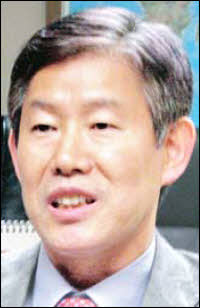
Libyans have deep trust in Koreans: ex-envoy

A former Korean Ambassador to Libya said the people there have a deep trust in Koreans thanks to their hard work there. But he also cautioned against excessive religious activities by some Koreans, saying they should respect Islam, the dominant religion there.
“Libyans were impressed by Koreans’ diligence in building the 4,000 kilometer-long Intracoastal Waterway,” said Chang Dong-hee.
Chang is an expert for international legal affairs and he was minister for the Permanent Mission to the International Atomic Energy Agency (IAEA). After that, he served as Korean ambassador to Libya from September 2008 to November 2010.
“Korean supervisors in a construction field evacuated 15,000 laborers from developing countries via chartered flights and the warship Choi Yeong in February 2011, during last year’s civil war. This led the post-Gadhafi administration to appreciate such help,” said Chang, now a senior representative of the Northeast Asian History Foundation.
“I am proud that the Korean Embassy in Tripoli was among the first foreign embassies to reestablish diplomatic relations, deepening trust between Korea and Libya,” he said.
He added that Korean companies such as POSCO will resume construction projects in the North African country, and continue to engage with the new administration.
“Under the strict control of Muammar Gadhafi, as far as Libyan public security was safe, there was no room for intervention by terrorist groups,” Chang said, in relation to the recent attack on the U.S. Ambassador in Benghazi.
“Global citizens should refrain from being extreme,” he said, asking Korean Christians not to try and force Muslims to change their religion.
He saw one Libyan lynched because he had converted to Christianity.
“An excessive evangelical act could make a Libyan person suffer in the Islamic society,” he added.
According to the International Contractors Association of Korea, from the 1980s to the beginning of 2000, Libya was second-highest in terms of overseas building contracts won by firms here.
Chang said that Korea, which was one of the poorest countries in 1960s, can share the knowledge and understanding of Islamic culture through various projects.
He also advised that “national integration” is the most important element for the stabilization of Libyan politics.
According to the Ministry of Foreign Affairs and Trade, some 20 Koreans are currently working as managers on power plant construction projects in Tripoli. <The Korea Times/Ryu Chang-gi>


